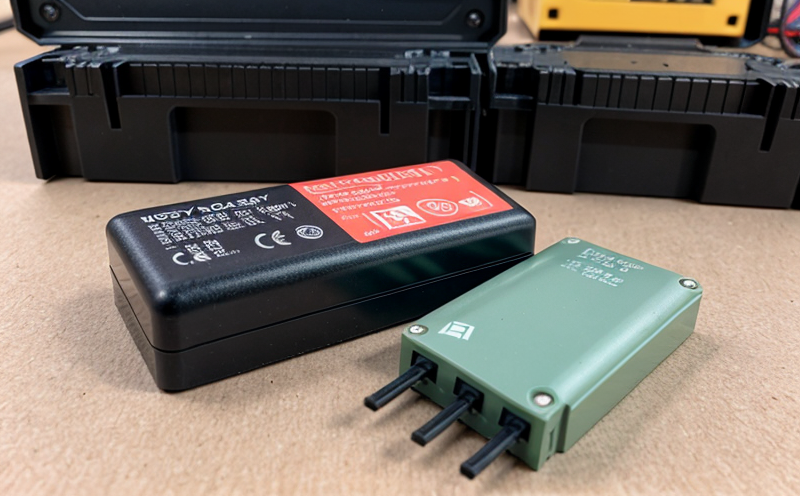ANSI C18.4M Household Battery Pack Performance Testing
The ANSI/UL C18.4M standard for household battery packs establishes performance, safety, and durability requirements to ensure the integrity of these products in residential environments. This rigorous testing protocol encompasses a variety of parameters that are critical for product reliability and consumer safety.
At its core, ANSI/C18.4M focuses on the operational characteristics of batteries used in home devices such as cordless drills, power tools, and other portable electronics. The test protocol is designed to evaluate the battery pack's performance under various conditions, including charging cycles, discharge rates, and temperature variations.
Testing begins with a thorough inspection of the battery pack for any visible defects or anomalies. This includes checking the integrity of the connector terminals and ensuring that all components are correctly assembled per the manufacturer’s specifications. After this initial examination, the battery is subjected to a series of performance tests:
- Charging Efficiency: Ensuring the battery can be charged efficiently without overheating or causing other safety hazards.
- Battery Capacity Testing: Measuring the actual usable capacity of the battery under specified conditions to ensure it meets advertised specifications.
- Discharge Rate: Evaluating how quickly the battery can provide power under load, which is crucial for performance in real-world applications.
- Temperature Cycling: Testing the battery's ability to withstand temperature fluctuations without compromising its integrity or causing safety issues.
The testing apparatus used includes specialized chambers capable of simulating a range of environmental conditions, from freezing temperatures to extreme heat. These chambers allow for precise control over variables such as humidity and atmospheric pressure, ensuring that the battery is tested under controlled environments that mimic real-world scenarios.
After completing these tests, the results are analyzed according to ANSI/C18.4M criteria. Compliance with the standard ensures that the battery pack meets all safety regulations and performs reliably over its expected lifespan. This testing process not only enhances product quality but also contributes significantly to consumer safety by reducing the risk of failures or hazards in use.
For R&D engineers, understanding these parameters is crucial for optimizing design and ensuring compliance with industry standards. Compliance officers benefit from this testing as it helps them maintain regulatory adherence and avoid costly legal issues. Quality managers can leverage this service to ensure that their products meet the highest quality standards, thus enhancing brand reputation and customer satisfaction.
The significance of ANSI/C18.4M testing in household battery packs cannot be overstated. It ensures that consumers have safe, reliable, and efficient power sources for their daily needs. By adhering to this standard, manufacturers can build trust with customers while also contributing positively to sustainability efforts by reducing waste and promoting the use of longer-lasting batteries.
In summary, ANSI/C18.4M testing is essential for ensuring that household battery packs are both safe and performant in residential settings. This rigorous protocol helps maintain high standards of quality and safety, ultimately benefiting all stakeholders involved—from manufacturers to end-users.
Why Choose This Test
The ANSI C18.4M Household Battery Pack Performance Testing is a critical service for manufacturers looking to ensure the reliability and safety of their products. Here are several reasons why choosing this test is beneficial:
- Regulatory Compliance: Ensures that all products meet stringent industry standards, thereby avoiding potential legal issues.
- Enhanced Product Quality: Identifies and rectifies any deficiencies in the design or manufacturing process before they reach the market.
- Increased Consumer Confidence: By meeting these rigorous standards, manufacturers can build trust with consumers who value safety and reliability.
- Sustainability Benefits: Longer-lasting batteries contribute to reduced waste and resource consumption, supporting environmental sustainability efforts.
For quality managers and compliance officers, this service provides peace of mind that all products are meeting the necessary regulatory requirements. R&D engineers can use the insights gained from these tests to refine their designs and improve product performance. Overall, ANSI C18.4M testing is an investment in both product quality and brand reputation.
Environmental and Sustainability Contributions
The ANSI/C18.4M Household Battery Pack Performance Testing plays a crucial role in promoting environmental sustainability by ensuring that batteries last longer and perform more efficiently. Here’s how this testing contributes to sustainability:
- Reduced Waste: Longer-lasting batteries lead to less frequent replacements, thereby reducing electronic waste.
- Energy Efficiency: Optimized battery performance ensures that devices operate more efficiently, consuming less energy over time.
- Social Responsibility: Meeting these standards demonstrates a commitment to responsible environmental practices, enhancing the company’s social image.
By adhering to ANSI/C18.4M testing protocols, manufacturers can contribute positively to sustainability efforts while also improving product quality and consumer satisfaction. This dual benefit makes it an essential service for any company serious about both its products and its environmental impact.
Use Cases and Application Examples
ANSI C18.4M Household Battery Pack Performance Testing is widely applicable across various sectors, particularly in industries that rely on portable power sources for their operations. Here are some use cases:
- Cordless Power Tools: Ensures the longevity and reliability of batteries used in drills, saws, and other tools.
- Laptops and Tablets: Validates that these devices can maintain optimal battery performance over extended periods.
- Camcorders and Cameras: Guarantees consistent battery life for video recording and photography needs.
For R&D engineers, understanding these use cases helps in designing more efficient and durable batteries. Quality managers can leverage this testing to ensure that their products meet the highest standards of performance and reliability. Compliance officers benefit from knowing which tests are necessary to stay compliant with industry regulations.





